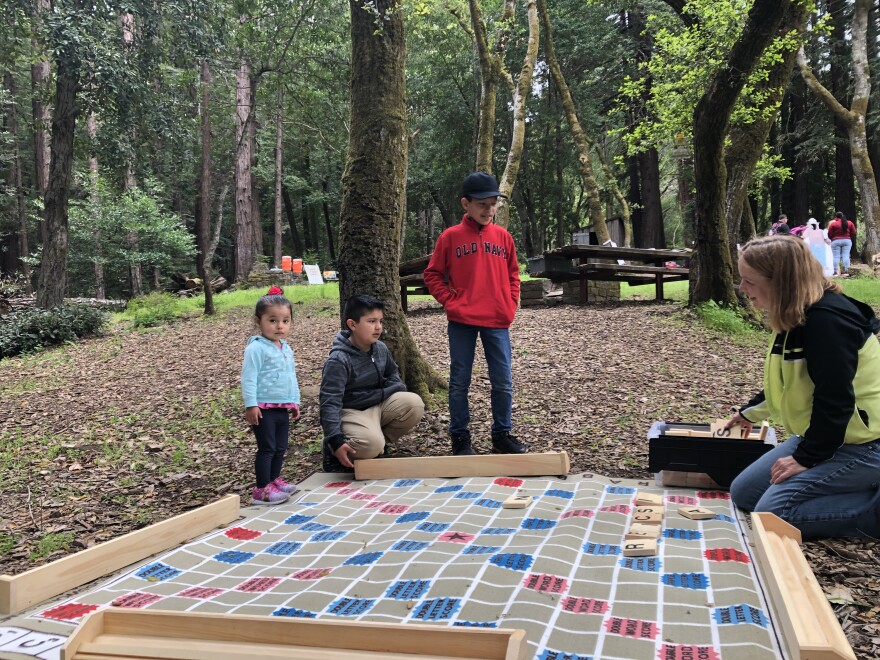This story most recently aired in the 1/9/23 episode of Crosscurrents.
From the smallest banana slug to the tallest redwood, park ranger Katherine Wright loves introducing new visitors to the sights and sounds of San Mateo County’s beautiful outdoor spaces.

As we hike a trail together at Wunderlich County Park in the town of Woodside, she points out a family of deer approaching in the tall grass just a few feet away from us. Loud birdsong resounds from above. Early afternoon sunlight squints through the redwood branches.
Ranger Wright has the enviable job of welcoming people into some of San Mateo County’s 21 parks and open spaces. And, for the past few years, she’s also been part of an initiative to connect a new group of visitors with nature.
San Mateo County is part of an innovative national program where doctors write a “prescription” for park and outdoor time to improve their patient’s physical or mental health and wellbeing.
What you get is similar to a regular prescription slip. But, instead of a list of medicines, there’s a space for your doctor to prescribe how many minutes and how often each week they’d like you to spend outdoors and in nature.
The prescribed activity could be a nature walk, a guided tour, yoga or meditation outdoors. Family activities pre-pandemic included lawn bowling and loteria -- a bingo game.
Basically, it’s Mother Nature as medicine.

Research shows that spending regular time outdoors helps to reduce headaches and mental fatigue, lower stress, and improve mood.
Ranger Wright says that many of the patients she meets may not have ever visited their local park. Or even hiked or biked a trail. Park life might not be part of their routine, tradition, or culture. Often, she sees patients visibly relax and immediately enjoy their new surroundings.
“Like looking at the trees, listening for the bird songs. And just having a nice chance to learn more about the natural environment,” she observes.
We often see people just feel like they visibly relax out here... And just kind of being present in the moment here. Like looking at the trees, listening for the bird songs.Park Ranger Katherine Wright, San Mateo County
San Mateo County has engaged a range of its residents in the parks program, including Tongan Pacific Islanders and the Latinx community -- some of whom are in low income groups. These groups have historically been disproportionately affected by health conditions including high blood pressure, diabetes, and mental health issues.
Gloria Cardenas lives in San Mateo with her husband and two teenage children. She’s just turned 50 and her family has been involved with San Mateo’s healthy lifestyles clinic for more than ten years, and with the parks program since 2019 when it started.
Cardenas’s pediatrician originally prescribed healthy eating and outdoor time to improve her children’s health. But now, she says, the whole family visits parks almost every weekend. And she has loved the social aspect of getting out and about -- meeting other families, playing games in the park, and sharing healthy food.
But her favorite thing about the program is walking in the woods, and learning about the animals and plants that live there -- even the banana slugs.
Cardenas says her children have become more active as a result of the program. Both have taken up wrestling in high school and her son plays tennis. He’s also developed a passion for cooking.

During lockdown, park rangers hosted Zoom meets for families to stay engaged in the program and offered ideas for outdoor activities in their parks that remained open.
As part of the program, health practitioners use an online system, which syncs with the patient’s existing health record to recommend outdoor activities.
Dr. Rachel Borovina is a pediatrician who works for San Mateo County Health. For years, she’s run a healthy lifestyles clinic. And, over the past few, she’s worked with county health chief Dr. Scott Morrow on the park prescription program.
For every child aged 2 to 18 years coming in for an annual check up, Dr. Borovina and her team ask about time spent in nature or outdoors. Everyone leaves with a prescription to spend one hour twice a week outdoors. And the team puts together what they call “informational prescriptions” which list the addresses of nearby parks, and the health benefits associated with outdoor time.
Last year, San Mateo County’s Park Prescription program issued annual park passes to 800 families who qualify for the CalFresh low-income benefit.
Dr. Borovina’s program is part of a wider nationwide initiative launched in 2013 by the San Francisco-based Institute at the Golden Gate. It now has an estimated 100 programs across the country.

Around three quarters of these programs tackle general wellness. The remainder address specific health goals like managing anxiety and depression, or reducing stress levels. Research into impact shows participation can help reduce blood pressure and feelings of loneliness.
However, Ranger Wright notes that there are barriers, such as transportation: “If it's not right in your backyard, like it is for some county residents, it can be challenging to get out to some of these more remote park locations,” she says.
Cost is another barrier, she says. “To enter some of the park sites, there's a vehicle entry fee of $6. And that can be a barrier for certain people. So we were looking into that. At one of our park sites, we've taken that vehicle entry fee away so it's now free to park.” However, she adds that it’s not a permanent solution because the parks need that revenue to support staff and other projects.

But for Gloria Cardenas in San Mateo, the parks program has been a game changer. Tonight, her son wants her to pick up fresh vegetables from the market so he can cook the family dinner. The Cardenas family’s involvement in the Park Prescription program has resulted in better eating, regular exercise, and more quality time together.
And that’s a recipe for good health.



